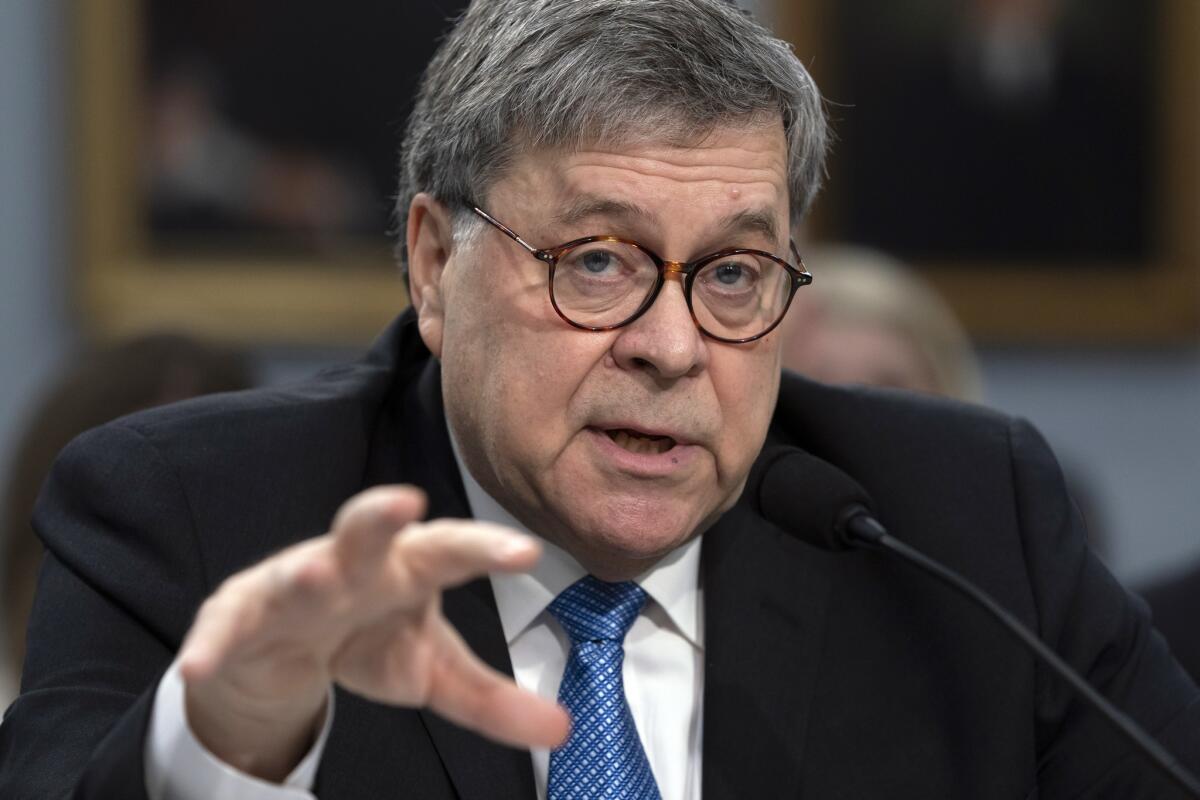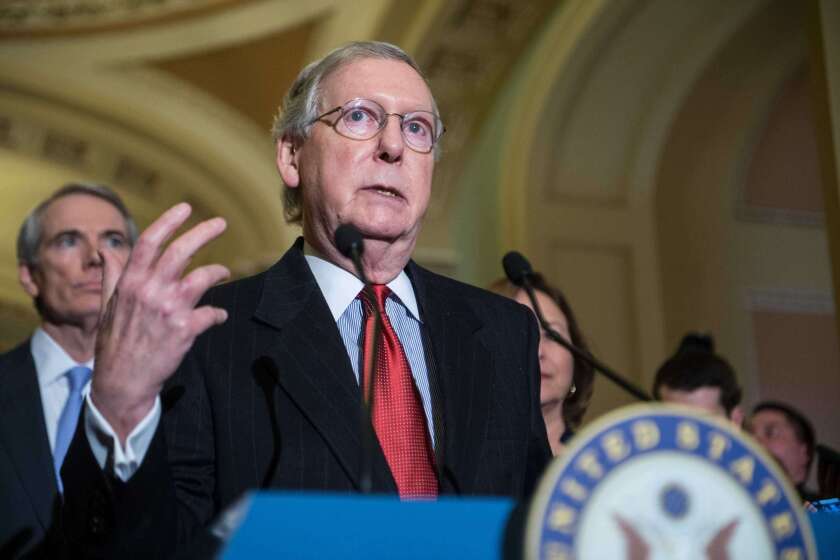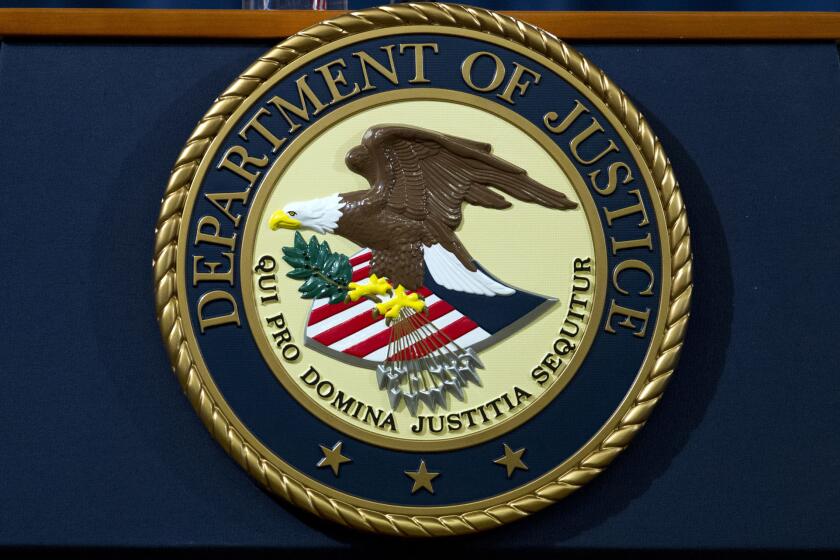Op-Ed: How to protect democracy from lawless presidents like Trump

The impeachment trial of President Trump has ended, but the threat to our democracy continues. In the short time since the trial concluded, the president has proven that the House managers’ warning to senators that he will never change was prescient.
President Trump’s actions demonstrate the need to develop and pass legislative reforms to safeguard the checks and balances of our democracy. Building new guardrails to defend against authoritarian-minded presidents must now be a top priority for Congress.
Within days of the Senate vote, Trump began to exact revenge against officials who complied with lawful subpoenas and told the truth to Congress. He had a security escort remove Lt. Col. Alexander Vindman, a decorated combat veteran, from the White House’s National Security Council, along with his twin brother, who served as an ethics attorney.
The president’s vengeance against civil servants is disturbing enough, but it occurred alongside an even greater danger that has come into sharper focus this week: the politicization and potential weaponization of the Department of Justice.
Trump insists he has the absolute right to direct the actions of the department. His efforts to obstruct investigations into his own misconduct and that of his associates — firing FBI Director James B. Comey, seeking to fire Special Counsel Robert S. Mueller III and much more — are well documented. And now, the president has found his Roy Cohn in Atty. Gen. William Barr, who has shown himself willing to be the president’s political fixer and do his bidding at the expense of the department’s independence.
The severity of the threat to our democracy was made plain last week in a succession of troubling actions by the Justice Department.
Poisonous partisanship didn’t start with Trump, but his rise has made it worse
Last Monday, the department recommended that Roger Stone, the president’s longtime political advisor and self-proclaimed “dirty trickster,” be sentenced according to standard federal guidelines for the serious crimes he committed. Mr. Stone was convicted last year on seven charges related to lying to Congress about his dealings with the president and WikiLeaks — the platform publishing Russian hacked emails beneficial to the Trump campaign — and witness tampering.
Late that same evening, the president tweeted in outrage, calling the recommendation “a miscarriage of justice.” The next morning, at Barr’s urging, the department reversed course and recommended a more lenient sentence, using language so unusual for the DOJ that it looked like it could have been written by Stone himself.
Barr claims he had planned to intervene in the case before reading the president’s tweet, but he does not deny his personal involvement. It is exceedingly rare for attorneys general to overrule the sentencing recommendation of their career prosecutors. Doing so in a case involving the president’s own wrongdoing may be unprecedented.
As a result, the career prosecutors on the case demonstrated something in short supply in the White House but abundant among public servants — moral courage. One by one, they withdrew from the case, and one resigned altogether.
By the end of the week, reports emerged that Barr had ordered the review of other “politically sensitive” criminal cases, including that of President Trump’s former national security advisor, Michael Flynn, who pleaded guilty to lying to federal investigators to cover up the nature of his own interactions with the Russians. This follows yet another Barr-ordered review intended to sow doubt about intelligence community findings that Russia interfered in the 2016 election to help then-candidate Trump, and a nearly successful effort to cover up the whistleblower complaint that ultimately led to Trump’s impeachment.
These interventions by Barr to benefit the president have profound implications for the rule of law and our democracy. With a willing attorney general and compliant congressional Republicans, Trump is attempting to utilize the instruments of justice for his political benefit, something that would give him immense power to punish and harass his political opponents and protect his friends.
We cannot let that succeed.
Institutions are only as strong as the people who protect them. Public servants, at personal cost, stepped forward in the impeachment inquiry and in the wake of the Stone sentencing reversal. Judges have also demonstrated a vital independence from this lawless president.
Congress must also do its part through vigorous oversight, and also by enacting a new set of reforms to prevent presidential abuses akin to those passed after Watergate. Work on these is already underway.
William P. Barr’s fixer factory can no longer be trusted at any level to act as a brake on the president’s gangsterism.
The president has continually taken advantage of the slow judicial review process to delay oversight of his administration. In response, Congress should enact legislation to expedite judicial review of congressional subpoenas, an idea House Republicans favored unanimously under President Obama.
There is also a clear need to legislate a stronger firewall between the Department of Justice and the White House, one secured by more than regulations or norms. One first step was introduced by my fellow House impeachment manager, Hakeem Jeffries, to require logging and disclosure of White House contacts with DOJ. But more will be required to prevent an unethical president from initiating or interfering in cases that involve the president’s enemies, allies or family members.
Along these lines, I have introduced legislation to constrain abuse of the pardon power. President Trump has repeatedly dangled pardons to his associates as they face federal criminal investigations. The bill would ensure that, in the event the president issues a pardon in a case related to him or his family members, the complete investigative files would be provided to Congress to ensure he could not obtain the corrupt benefit of covering up his own misconduct.
Some of these reforms may not become law while Trump remains in office, but that must not stop us from getting started. The future of our democracy depends on it.
Adam Schiff (D-Burbank) represents California’s 28th Congressional District in the House of Representatives, where he serves as chairman of the Permanent Select Committee on Intelligence.
More to Read
A cure for the common opinion
Get thought-provoking perspectives with our weekly newsletter.
You may occasionally receive promotional content from the Los Angeles Times.












